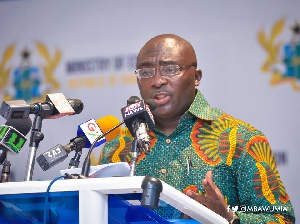The Vice President, Dr. Mahamudu Bawumia, has said revenue mobilisation has not kept pace with the ever-growing developmental needs of the country, the reason a paradigm shift must be pursued in raising domestic revenue.
This paradigm shift, he said, “has now become a necessary requirement if we want to build a good society for ourselves”.
All over the world, he said, taxation is the main tool countries rely on to mobilise revenue to develop their economies and provide services to their people.
“Perhaps, least talked about and also less understood by many of us is that whatever the advanced countries send to us as aid is the result of their own ability to mobilise domestic resources,” he said.
What we take for granted as aid resources, is the result of their capacity to raise taxes, especially income tax. As we embark on this journey of Ghana Beyond Aid, it is imperative for us to take rigorous and decisive steps to raise enough income tax.”
Dr. Bawumia made this call at the launch of the Tax and Good Governance Week in Accra, an initiative of the Ministry of Finance and the Ghana Revenue Authority, geared towards encouraging filing of annual tax returns and increasing the level of voluntary tax compliance.
The week long programme is on the theme: “Filing Your Tax Returns, Your Civic Responsibility,” and complements the National Tax Campaign instituted in 2017.
“During this programme, GRA will mount tax clinics at specific places to assist citizens with the filing of their tax returns as well as other tax-related matters,” the Vice President reminded Ghanaians.
“The tax return forms have been modified to make it easier to fill. Arrangements are also being made to provide a more efficient electronic system for filing returns in the very near future.”
Ghana, he pointed out, ranks below Cote d’Ivoire, Kenya, Senegal, Cape Verde and Swaziland in terms of the contribution of payroll tax to GDP.
In the 2015/2016 fiscal year, PAYE contributed about 15% of total domestic revenue, the self-employed about 1.1% and corporate tax about 19%. The combined contribution of about 35% is significantly below Singapore’s 50%, South Africa’s 54%, Canada’s 58% and Denmark’s 60%, the Vice President disclosed.”
Currently, out of a potential six million individual taxpayers, only about one million, five hundred thousand are registered with the Ghana Revenue Authority.
Of this number, per the last survey conducted by the Statistical Service, one million, three hundred and sixty-four thousand are employees, which implies that self-employed individuals contribute very little to income taxes.
Finance Minister, Ken Ofori-Atta, said ‘Ghana-beyond-Aid’ would only happen if the country was able to generate enough revenue to meet its needs.
He said the vision required that all Ghanaians rally behind the government to achieve the needed revenues.
“Every citizen is part of this vision and it is my hope that such events would lead to a paradigm shift for all of us to honour our tax obligation, which includes the filing of tax returns,” he said.
“This campaign is therefore a call to honour our civic duties and ensure that we position ourselves to get to our desired destination of Ghana beyond Aid,” he added.
The Commissioner-General of the GRA, Kofi Nti, said the authority could not continue to always run after taxpayers using coercion to ensure compliance.
He said in line with best practices in the developed world, it expects taxpayers to voluntarily honour their tax obligations without any compulsion.
He said one of the key means of ensuring voluntary compliance was to have a well-informed taxpayer population.
The Tax and Good Governance Week, he said, therefore seeks to bring information to taxpayers, letting them understand their rights and responsibilities, the various tax policies and the need to honour all their obligations.
Business News of Tuesday, 10 April 2018
Source: thebftonline.com













